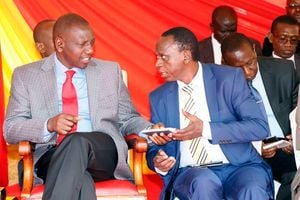As you dream big, remember you need to start small

What you need to know:
- The other major lesson has been the need to keep up-skilling. To remain relevant in any field, you cannot assume yesterday’s lessons are enough for a lifetime.
- The world is always changing and you need to change with it, evolve, and learn new things.
- That way you can stay competitive and advance in your career.
James Gathuita, 29, is a human resource expert and career coach. HR is a critical department in any organisation, primarily because HR officers have the power to hire and fire. Because conducting interviews is part of his daily job, we start with a question often asked by interviewers:
Tell us about yourself…
My name is James Gathuita, the human resource business partner at Kasha global, which is an e-commerce platform for women’s health, personal care and beauty products. Our goal is to make health and self-care products, and information accessible to women so that they can live their best lives, including those in low-income rural areas of emerging markets. I oversee the recruitment of staff, and oversee employee welfare.
Can you remember your first job interview?
My first interview, despite having graduated with a degree in human resource management, was for a teaching position. I joined a church-based academy as an untrained teacher where I also took up office administration roles that eventually revolutionised the school’s operations. Prior to my interview, I had done a lot of background study on the institution which made me a little overconfident. I was still anxious though, but I was well prepared and that helped me secure the position. Interviews are not everyone’s cup of coffee.
How did you end up in HR?
My career journey began in September 2015 when I worked as a HR intern at Geothermal Development Company in Nakuru. I have held 10 different roles in various organisations throughout my career. At the beginning of last year, I joined Ponea Health as an acquisition associate. Ponea is a start-up that connects patients with doctors online. I was later promoted to HR and operations associate in May, before joining Kasha later in October.
In all these roles, what is the biggest lesson you have learnt?
I have picked many valuable lessons in every role I have held, even ones that are not directly related to my profession. For instance, being a teacher taught me the importance of patience and the need for emotional intelligence when dealing with people. It also honed my conflict resolution skills, which are quite important to a HR professional.
The other major lesson has been the need to keep up-skilling. To remain relevant in any field, you cannot assume yesterday’s lessons are enough for a lifetime. The world is always changing and you need to change with it, evolve, and learn new things. That way you can stay competitive and advance in your career.
Communication and presentation is also key. Take for instance a fresh graduate who does not have relevant work experience. If she can prove to interviewers that she can learn and execute the tasks efficiently and effectively, then she stands a better chance of securing the job. It does not matter who you are, if you cannot communicate and express yourself effectively then you will have a difficult time getting new roles and even interacting with colleagues. I have also come to learn that ‘No’ is a perfectly good answer.
What, really, is today’s employer looking for?
I cannot speak for all employers as different organisations follow different recruitment policies. However, attitude is very important. When you walk into an interview room, the first thing the interviewer takes note of is not your academic qualifications, but rather your behaviour. How you carry yourself and how you interact with others.
There is also something called cultural fit. While applying for a position, you need to understand the culture of the organisation, their goals, mission and vision. This way, you can determine whether they align with yours, and know how to adjust or position yourself. You need to analyse yourself thoroughly before walking into the interview room.
I have also seen people who cannot defend the ‘how’ in their CV’s, including senior colleagues. If you have a list of relevant experience or achievements in your CV, you should be able to show how you achieved them. A lot of this is about how you express yourself.
Is there a disconnect between our education system and the professional world?
Yes, there is a huge gap between the skills and expectations that a lot of young people have, and the skills required and the reality of the professional world.
Kindly explain further…
I am a career coach and during my interactions especially with university students, I meet many young people who are out of touch with the reality of work life. Many young people are ambitious and want to achieve big milestones, but they do not seem to understand the need to start small as they make their way up. Ambition is a good thing, but ambition without drive and wisdom is useless.
For instance, while applying for jobs, many just apply for any position that comes their way out of desperation. A better strategy would be, even if you are not applying for a job in a field you studied for, have a clear goal of where you are heading and how to get there. You can start as a teacher like I did, for instance, but have a clear path in your mind of where you want to end up, whether it is in the same field or elsewhere.
Another point to note is the importance of both soft and hard skills. Many focus on the latter and forget about the former. Hard skills can get you the job but soft skills will get you promoted.
My bosses and I come from different generations, how do I deal with this?
Generational dynamics affect every aspect of our lives. It basically informs how we view life. You should focus on individuals and their character, rather than their age. If, for instance, you are a Gen-Z and your approach to work and life is different from that of a boss or senior colleague who is older, seek to understand them. Why do they behave the way they do, what drives them and how can you reach a common ground?
It is also important to remain respectful. You can disagree with someone, but it is not so much what you say as how you say it. I am also a believer in reverse mentorship. Young people are here to stay and they are the future of work. It is therefore important to recognise the shifting work dynamics, and level the playing ground for young people.
How do you unwind?
I love reading and travelling. If I found a job where I was on the move all the time, it would just be perfect.





